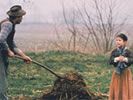Eye For Film >> Movies >> The Tree Of Wooden Clogs (1978) Film Review
Neo-realism was eventually overtaken by Nouvelle Vague, although it did not end there. Ermanno Olmi, whose Il Posto (1961) was a classic of the genre, won the Palme D’Or at Cannes in 1978 with The Tree Of Wooden Clogs, a three hour marathon of peasant life in Lombardy at the turn of the 19th/20th centuries, using non-actors from the Bergamo district and shot in 16mm, with the director performing the additional duties of scriptwriter and cameraman.
It is, of its kind, a masterwork, the only drawback being its length and (possibly) the absence of a storyline. The Marxist message and anti-Catholic bias fits neatly into the body of the film, without prejudicing it. The hardship of their lives may compare unfavourably with that of the landlord, who owns everything – their homes, fields, crops and the majority of livestock – yet the sense of community and shared experience is a powerful unifying force.

Amongst the chattering classes, there is a tendency to romanticise close-knit rural families, when milk came direct from cows, butter was churned in the byre, children played in the mud, geese and hens foraged free, Health & Safety hadn’t been invented and everyone looked out for everyone else. Olmi is no romantic. The life of these peasants, illiterate, God fearing and hidebound by tradition, is subservient, harsh and beholden to their feudal master.
The women and young girls have babies in their arms and pails of water in their hands. They dress in black, or dark colours, and are cleaning, knitting, mending, cooking, washing and gossiping. One of the little boys walks five miles to school and five miles back every day. He’s the only one. His dad carves him a new pair of clogs from one of the landlord’s trees, because his old ones are warn down, and it causes terrible trouble.
The film follows the travails and small victories, such as grandpa’s early tomatoes and a marriage, with compassion rather than sentimentality. The beheading of a goose and disemboweling of a live pig emphasise the reality of the farmyard. There is no cruelty intended, simply necessity. When a cow, belonging to one of the families, falls sick, they call out the vet. When a baby is due, they decide they cannot afford a midwife. In the evenings, the families gather in the stable for storytelling, singing and conversation. The young girls’ suitors are welcomed in their Sunday best, but only as observers, and so stand at the back trying to catch the eye of their wished-for beloved.
“I didn’t see you in church,” the priest tells the widow, who takes in washing for a pittance.
“I have six children and no husband,” she replies. “I could not find the time.”
The priest says the Church will adopt the little ones to “relieve the burden,” which is not unlike when the married couple go to a nunnery in the big city to see the young bride's aunt and are emotionally blackmailed to return with a one-year-old orphan, blessed by the holy sisters.
As a record of life before emancipation, when farm labourers had less rights than the beasts of the fields, this is a tribute to their spirit and an uplifting testament to human endeavour.
Reviewed on: 04 Nov 2007



















